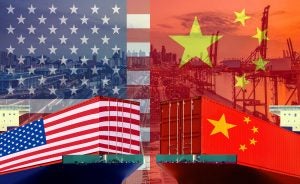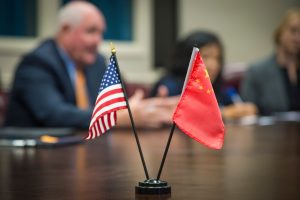“This is an existential struggle over what life will look like in the 21st century — and the most fundamental freedoms are at stake.”
That’s how Rep. Mike Gallagher described the current “situation” with China. Gallagher chairs the newly formed Select Committee on the Strategic Competition Between the United States and the Chinese Communist Party, which will spotlight China and the threat it poses to the United States. But it isn’t alone. Capitol Hill is buzzing with activity as lawmakers grapple with how the U.S. should respond to China’s recent actions.
Over the last few months, China has ratcheted up the stakes. There was the mysterious spy balloon that floated halfway across the U.S. before being shot down off the coast of South Carolina. We’re now learning that the Chinese equipped that balloon with technology allowing it to intercept communication signals. Of course, we also learned this wasn’t the first time the country invaded our sovereign airspace.

Then there’s the precarious situation with Taiwan. Although the U.S. has long followed a one-China policy (meaning Taiwan wasn’t formally recognized as a separate nation), the Biden administration has changed that approach. Last May, President Joe Biden affirmatively answered a question about whether the U.S. would send military aid to Taiwan if China invaded. And recent military maneuverings — similar to Russia’s before it invaded Ukraine — show that Beijing might be ready to test that promise.
Speaking of Ukraine, the communist administration in China is making moves there too. Until recently, China stayed (somewhat) neutral about Russia’s invasion by not condemning it or supporting it. In fact, President Xi Jinping even presented a so-called peace plan, though it was quickly rejected by the West (and not without good reason). But Putin has now invited Xi Jinping to visit this spring. And it looks like China will supply Putin’s armies with ammunition and artillery, which would greatly boost Russia’s chances of military success in the conflict.
And just this week, federal agencies, including the FBI, revealed that the COVID-19 pandemic probably started as a leak from a laboratory in Wuhan, China (though, admittedly, there’s definitely no consensus and the evidence for either natural or lab is scant). Why does it matter? Because it could mean that the Chinese government’s lab unleashed a virus on the world that killed over 1 million Americans.
In sum, China is looking every part of an adversary.
In this sense, farmers were way ahead of the trend. Though it baffled observers at the time, most farmers applauded the Trump administration’s tariffs against China. Why? Because China is a notoriously bad actor when it comes to trade. It messes with commodity prices (just ask Syngenta), cancels contracts, and manipulates markets in its favor … and usually at the expense of U.S. farmers. So its recent actions are no surprise to American agriculture.
Here’s the problem: we actually need China.
For all its faults, China is the single largest purchaser of U.S. agriculture exports. It buys more of our crops than anyone else in the world. That’s not necessarily surprising, because it also has the largest population over every other country in the world.

And yet there again is the problem: China’s population is potentially facing a collapse. Decades of a one-child policy has finally started to show results, as the number of citizens dropped for the first time since the 1960s (though Chinese families are now allowed up to three children). Some estimates predict that its population could fall from 1.3-1.4 billion down to 1 billion in 2050, and only 494 million by 2100. The result would be calamitous for U.S. agriculture.
So whether it’s a threat to national security, our economic prosperity, or international relations, what the Chinese government does impacts us. It feels like there’s no good solution either. A China weakened by population decline is good for national security, but not for economic security. A growing and expanding China is good for our economy, but dangerous on the world stage.
In short, this China stuff is complicated.
Amanda Zaluckyj blogs under the name The Farmer’s Daughter USA. Her goal is to promote farmers and tackle the misinformation swirling around the U.S. food industry.



